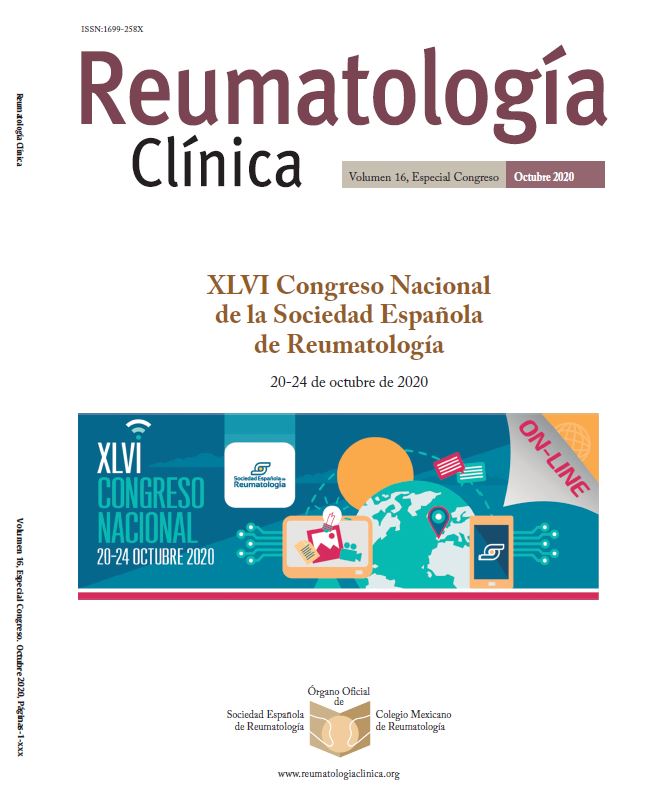P208 - Sarilumab, a Human Monoclonal Antibody to the Interleukin-6 Receptor, in Polyarticular-course Juvenile Idiopathic Arthritis: A 12-week, Multinational, Open-label, Dose-finding Study
1Hospital Universitario y Politécnico La Fe. Valencia. 2Hospital Infantil Universitario Niño Jesús. Madrid. 3University Hospital Dr. José Eleuterio González. Monterrey (Mexico). 4Centre of Pediatric Hematology. Oncology and Immunology. Moscow (Rusia). 5Necker Hospital. Paris (Francia). 6Andrzej Frycz Modrzewski Krakow University. Krakow (Poloni). 7VA Nasonova Research Rheumatology Institute. Moscow (Rusia). 8Bioreuma. Concepción (Chile). 9CREA de Guadalajara. Jalisco (Mexico). 10Sanofi. Bridgewater. NJ (EEUU). 11Regeneron. Tarrytown. NY (EEUU). 12Sanofi. Paris (France). 13Bambino Gesù Children’s Hospital. Rome (Italia).
Introduction and objectives: Sarilumab blocks interleukin-6 (IL-6) from binding to membrane and soluble IL-6 receptor-α. Sarilumab is approved for adults with rheumatoid arthritis (RA) and is being investigated in a Phase 2 trial (NCT02776735) in 2-17-year-old patients (pts) with polyarticular-course juvenile idiopathic arthritis (pcJIA), comprising rheumatoid-factor (RF)-positive and RF-negative polyarticular and extended oligoarticular JIA. This study aimed to evaluate pharmacokinetics (PK), pharmacodynamics (PD), safety, and efficacy of 3 subcutaneous (SC) sarilumab doses in pcJIA.
Methods: A 12-week dose-finding study was performed to identify an appropriate sarilumab dose for use in the pcJIA population. Pts were divided by body weight into 2 groups: A (30-60 kg) and B (10- < 30 kg), and received sequential ascending doses of sarilumab, Dose 1 (Group A/B): 2.0/2.5 mg/kg q2w; Dose 2 (Group A/B): 3/4 mg/kg q2w; and Dose 3 (Group A/B): 2.0/2.5 mg/kg qw. pcJIA doses were targeted to achieve similar exposure to adult RA doses (150 mg q2w, 200 mg q2w, and 150 mg qw). Primary outcome was PK; secondary outcomes were safety, PD, and efficacy of sarilumab.
Results: 42 pts enrolled (20/22 in Groups A/B); mean age was 13.0/5.2 years. At baseline, mean pcJIA duration, number of active joints, and JADAS27-CRP were 4.6/1.7 years, 17.2/11.0, and 22.2/19.1, in Groups A/B, respectively. As in adult pts, sarilumab exhibited nonlinear PK with target-mediated drug disposition (TMDD). Following repeated SC administrations, exposure increased in a greater than dose-proportional manner and accumulated 1.9 -4.5-fold over 12 weeks. Sarilumab exposure was similar in both weight groups for each dose, and comparable to corresponding adult doses. Treatment-emergent adverse events (AEs) were reported in 36/42 (85.7%) pts (comparable across dose and weight groups); infections (28/42, 66.7%) were the most frequently reported AE. 12 grade 3/4 neutropenias were identified, mostly in Dose 3 (n = 6) and in Group B (n = 8). None was associated with infection; all resolved in a few days. Overall, 4 pts discontinued due to neutropenia and 1 due to alanine aminotransferase increase. There were no serious AEs, no cases of GI perforation, and no deaths. By Week 12, as observed while on-treatment: all pts attained JIA ACR30; 50%, 62%, and 100% of pts attained JIA ACR70 with Doses 1, 2, and 3, respectively; JADAS27-CRP mean% changes from baseline in Doses 1, 2, and 3 were -74.6%, -73.1%, and -87.9%, respectively.
Conclusions: Sarilumab exhibited nonlinear PK with TMDD. Doses tested in pcJIA yielded similar exposure in both weight groups and were comparable to equivalent doses in adults with RA. All dose regimens proved effective for decreasing disease activity. Safety profile was consistent with class effects; higher incidences of neutropenia were observed with Dose 3, and in pts weighing 10- < 30 kg.
Código EUDRACT: NCT02776735.






